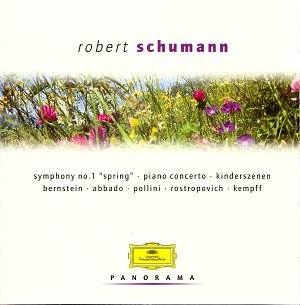Robert SCHUMANN (1810-56)
Symphony No. 1 in B flat, Op. 38, 'Spring'a. Kinderszenen,
Op. 15b. Cello Concerto in A minor, Op. 129c. Fantasie
in C, Op. 17d. Arabeske in C, Op. 18e. Piano Concerto
in A minor, Op.
5fe.
 cMstislav Rostropovich (cello);
bWilhelm Kempff, deMaurizio Pollini (pianos);
aVienna Philharmonic Orchestra/Leonard Bernstein;
cLeningrad Philharmonic Orchestra/Gennadi Rozhdestvensky;
eBerlin Philharmonic Orchestra/Claudio
Abbado
cMstislav Rostropovich (cello);
bWilhelm Kempff, deMaurizio Pollini (pianos);
aVienna Philharmonic Orchestra/Leonard Bernstein;
cLeningrad Philharmonic Orchestra/Gennadi Rozhdestvensky;
eBerlin Philharmonic Orchestra/Claudio
Abbado
 DG Panorama 469 199-2
[bcdADD/aefDDD]
[145'12]
DG Panorama 469 199-2
[bcdADD/aefDDD]
[145'12]
Crotchet
bargain price

This two-CD set deserves an (almost) unreserved welcome. DG have, to their
credit, included performances by two controversial artists: Leonard Bernstein
(Symphony No. 1) and Maurizio Pollini (who gets the whole of the second disc
to himself).
Bernstein's 'Spring' symphony is full of life: the Vienna Philharmonic play
as if this is the greatest symphony ever written. Accents are incisive and
the opening is a full-blooded, unapologetic reveille.
Rostropovich's account of the under-played Cello Concerto is similarly
convincing, The Russian cellist is on top form, and Rozhdestvensky is a natural
accompanist. Rostropovich luxuriates in the extended first movement and gives
much life to the finale.
Wilhelm Kempff's account of Kinderszenen is the only disappointment
of this set. He misses much of the sense of fantasy and (most importantly)
discovery, and any tenderness comes too late in the performance to redeem
it.
The contrast with Pollini's magisterial pianism is all the more stark because
of this. His 1973 Fantasie has tremendous sweep. There is a real sense of
intimacy (the last movement is the perfect track to play to anyone who thinks
of Pollini as merely cerebral). His Arabesque is fluid and delicate,
with the tone appropriately lightened. The Piano Concerto continues this
standard (with the exception of a bad edit about six seconds in!). The
improvisational, autumnal atmosphere is caught to perfection and Abbado is
the perfect partner: the contrapuntal passages in the finale are wonderfully
alive. Also, Pollini shows himself to be capable of the lightest, gossamer
touch.
A marvellous set, only marginally marred by Kempff's contribution.
Reviewer
Colin Clarke

